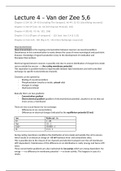Class notes
Philosophy 364 Exam Notes
- Course
- Philosophy 364 (PHIL364)
- Institution
- Stellenbosch University (SUN)
Notes include all the work covered for the exam namely, week 1-8. Week 1: Introduction and Justice as Fairness Week 2: Justice as Fairness (cont.) WEEK 3: Justice as entitlement to holdings WEEK 4: Justice as complex equality WEEK 5: Justice and capability WEEK 6: Capability and Ubuntu W...
[Show more]












